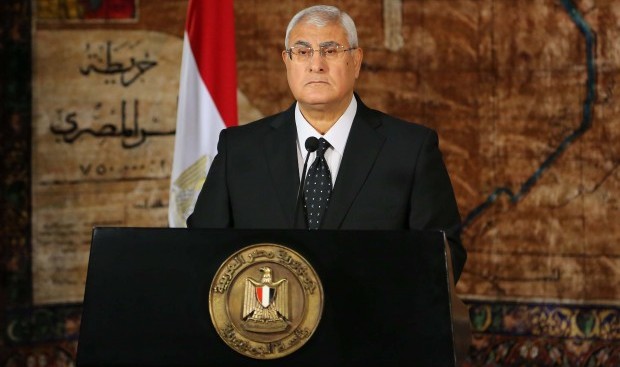
In this Thursday, July 18, 2013, photo released by the Egyptian Presidency, Egypt’s interim President Adly Mansour makes his first address to the nation after taking his post following the ouster of Islamist President Mohamed Mursi in Cairo, Egypt. (AP Photo/Egyptian Presidency)
Cairo, Asharq Al-Awsat—Egypt’s transitional roadmap was thrown into doubt once more on Saturday after local media reported that interim president Adly Mansour met with consultants to discuss “errors” in the final draft of the constitution that had been sent to him for approval by the 50-member constitution-drafting panel.
The interim president, a well-respected constitutional scholar and head of Egypt’s Supreme Constitutional Court, had been expected to quickly sign off on the final draft of the constitution, paving the way for a public referendum in January and parliamentary and presidential elections next year.
However, Egypt’s privately owned Al-Masry Al-Youm newspaper reported that the interim president was not happy with the draft. The newspaper quoted a well-informed source, who said: “The mechanism for fixing these errors has yet to be determined, and is whether the draft will be returned to the 50-member constitution committee for amendment or not.”
The same source, speaking to the Egyptian newspaper on the condition of anonymity, affirmed that the interim president intends to abide by the original terms of the transitional roadmap to hold parliamentary elections before presidential ones.
The final draft of the constitution has cast doubt on Egypt’s transitional roadmap, particularly an article stating that “procedures” for a “first election” must begin at least 30 days following the adoption of the constitution, adding that procedures for the “other election” must begin within six months. The original roadmap set out by Egypt’s military following the ouster of former Islamist President Mohamed Mursi explicitly stipulated that parliamentary elections would precede a presidential vote.
The final draft of Egypt’s new constitution had already been criticized for a perceived strengthening of the military’s powers. Others criticized some constitutional articles for a lack of detail, and for including too many provisions. The draft constitution included articles on organ donation and random housing (squatting), as well as those stipulating minimum percentages of the gross national product that should be spent on education and healthcare.
Questions have been raised over an expected mid-January constitutional referendum, amid calls from some political parties to boycott the process. The Muslim Brotherhood, which boycotted the constitution-drafting process, have called on their supporters to boycott the poll, claiming that the suspension of the 2012 constitution is illegal and that Mursi remains Egypt’s legitimate leader.
Hossam Munis, the official spokesman for the Young Popular Front, told Asharq Al-Awsat that supporters of the “June 30 revolution” have a unified position to vote “yes” on the draft constitution, despite reservations from some parties.
“However, this does not preclude us from criticizing the government that emerges to represent the June 30 revolution,” he said.
Munis added: “Poor administration [of the constitutional referendum] could lead to the continuation of divisions, and we will confront any party that seeks to drag us back to the past.”
“There are some issues regarding the constitution, and a better draft could have emerged if those in charge of the current phase demonstrated greater flexibility,” he added.
The Popular Front had previously rejected the current wording of the constitutional article on military trials for civilians, threatening to vote against it in a nationwide referendum.
For his part, Wafd Party Supreme Council member Yasser Hassan told Asharq Al-Awsat that his party will also vote “yes” in the forthcoming constitutional referendum. He added that any disagreements over the final draft of the constitution must be viewed in the context of partisan differences.
Egypt’s Tamarod Movement, which played a primary role in the protests that led to Mursi’s ouster, have launched its own “Yes to the constitution” campaign.
“This constitution is not the best, but it is better than the 1971 and 2012 constitutions,” the Tamarod Movement said via Facebook on Thursday.
Tamarod Founder Mohamed Abdel Aziz, who served on the 50-member constitutional panel, has called on Egyptian citizens to take to the streets to discuss the draft.
